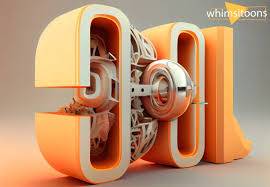3D Design and Motion Graphics on the Rise
The digital landscape is evolving rapidly, and 3D design and motion graphics are leading the charge. From social media platforms to websites and brand identities, the demand for engaging, dynamic visuals has never been higher. Businesses and creators are embracing motion design, 3D elements, and animated logos to capture attention and differentiate their content in an oversaturated digital world.
Why 3D and Motion Graphics Are Trending
One of the biggest reasons for the popularity of 3D and motion graphics is the need for more interactive and eye-catching content. Static images are effective, but motion adds an extra layer of engagement. Whether it’s a smooth product animation, a dynamic social media post, or a brand logo that comes to life with movement, these designs leave a lasting impression.
Additionally, with advancements in technology and design software like Blender, After Effects, and Cinema 4D, creating high-quality motion graphics and 3D designs is more accessible than ever. Designers can now produce professional-grade content without the need for massive budgets or extensive teams.
Branding and Animated Logos
More companies are adopting animated logos to stand out in a competitive marketplace. These logos are no longer static symbols but instead feature motion and transformation, giving brands a modern and innovative feel. A quick, sleek animation can convey creativity and forward-thinking, which is especially useful for tech, media, and creative industries.
Major brands like Netflix, Google, and Nike use motion graphics and 3D elements to enhance their branding. For example, Netflix’s recognizable "N" animation creates an immediate brand association, while Google’s simple, colorful animations reinforce its approachable image.
Social Media and Web Content
Platforms like Instagram, TikTok, and YouTube have become visual battlegrounds for attention. Motion graphics and 3D design help content creators and marketers stay ahead. A cleverly animated post or a 3D product preview can drive higher engagement and shares compared to traditional content. This trend is also shaping web design, where interactive elements and motion can make websites feel more immersive and user-friendly.
The Future of Motion and 3D Design
As technology continues to evolve, the line between digital and real-world experiences will blur further. Virtual reality (VR), augmented reality (AR), and 3D web elements will likely become mainstream. This means now is the perfect time for designers and businesses to invest in motion and 3D design skills.
What do you think about the rise of 3D design and motion graphics? Leave your comments below and follow us for more updates on design trends!


